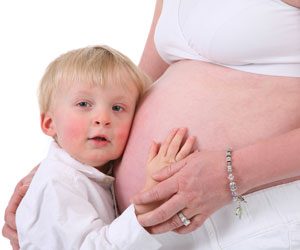What is happening?
During this period the baby increasingly matures as well as gains weight. At 34 weeks of pregnancy, the baby weighs around 2 kilograms and their chances of survival are very good. The lungs are much more mature and able to cope with life outside the uterus. The baby’s fingernails have now reached their fingertips and the toenails are better developed.
At 38 weeks of pregnancy, the baby will be around 45-55cm long and around 3000-4000gms. From now on the baby is classified as ‘full term’ and is likely to be born at any time. The toenails now reach the tips of the toes and fingernails will extend beyond the tips of the fingers. The baby will tend to flex its limbs and have a firm grasp if you put a finger in its hand. During the last couple of months, the baby puts on around 200gm a week. The white vernix, which was covering the skin, has now mostly come off, giving the amniotic fluid it white flecked appearance. The testes should now be in the scrotum in males. The baby can suck very effectively.
Changes in your body
The last trimester is the most uncomfortable one. It is also often the most emotional one. As the baby grows the mother may start to feel increasingly tired and find it hard to sleep at night. Everything inside that cosy, watery world is getting very cramped. Backache is more common due to the weight of the baby combined with softening of ligaments due to the hormones of pregnancy. Women often get stretch marks in the third trimester. It is common to become increasingly breathless as the baby presses upwards, compressing the lungs. Indigestion may also worsen at this time, as the uterus pushes on the stomach.
The baby’s head may start to descend into the pelvis in the last couple of weeks causing increased pressure on the mother’s bladder and back.
As birth approaches, women become very focused on the upcoming event and fears arise. As they get the nursery ready and layout the tiny clothes the reality hits that soon they will be mothers. It is natural for them to wonder, with the lack of sleep and raging hormones, if they will be able to cope with the demands of this great unknown. There is nothing wrong with a good cry!
Appointments and tests
From 29 weeks until 36 weeks you will have antenatal visits every 2 to 3 weeks and then weekly from 36 weeks until the birth.
Some women will be offered a low vaginal swab to screen for a common type of bacteria called, Group B Strep. At 36 weeks of pregnancy you may be asked to have another blood test to check for anaemia again. If you have a negative blood group you may be offered another injection of Anti D, between 34 and 36 weeks.
Most women who attend preparation for parenthood classes do so during the last trimester. This is a good opportunity to discover more information and useful tips for coping with the birth and parenthood. It also helps provides social connections with other couples having babies at the same time as you are. Some couples who meet in these classes remain friends for the rest of their lives.
Somewhere between 38 and 42 weeks labour begins and the baby emerges from its watery world and greets its parents. That first cry opens up 25 million air sacs in the lungs, which up until now have been filled with fluid. The lungs empty of fluid and fill with air and blood is re-directed into the lungs, then all over the body. A new life is born. For the parents an amazing journey has ended and another called parenthood is about to begin.
Third Trimester Guide for Pregnant Women
| Baby’s development |
| Weighs around 2 kilograms (34 weeks) |
| Baby is full term and weighs 3-4 kilograms (38 weeks) |
| Putting on about 200grams a week |
| Changes in your body |
| Increasingly tired |
| More backache |
| Stretch marks more likely |
| Swollen ankles and hands |
| Difficulties sleeping |
| More breathless |
| Indigestion may worsen |
| Going to the toilet more often |
| Baby’s movements more deliberate |
| Appointments and tests |
| 2 to 3 weekly visits until 36 weeks |
| 1-2 weekly visits from 36 weeks until birth |
| Parenting and birth preparation classes |
| 36 weeks-possible blood test for anaemia |
| 34-36 weeks blood test for antibodies if blood group negative and anti D injection |
| Possible vaginal swab for Group B Strep bacteria |




It is so exciting in the third trimester knowing that it won’t be long until you meet your baby. I have found it hard to get comfortable in these weeks of pregnancy, and went to sleep surrounded by cushions and pillows.